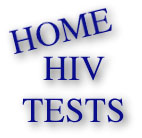

Badpuppy Gay Today |
Monday, 31 March, 1997 |

You think you're HIV-positive. You don't want anyone else to know, so you purchase a home HIV test kit. After drawing a blood sample, you ship it off to a clinic in New Jersey. Two weeks later, you call an 800-number for your results. You wait to hear a recording saying you're negative then..... This is a situation in which thousands of Americans are finding themselves these days as they struggle to deal with the epidemic in their lives. While everyone agrees anyone who is sexually active should be tested, there are disagreements as to how that testing should be done. "Testing is very important in battling HIV, but I don't believe it should be done through home tests," says long-time AIDS activist Alan Terl. But manufacturers of home HIV tests and most state governments say the home kits are important in combating the spread of AIDS. A study performed by one HIV home-test kit manufacturer, Home Access Health, shows there is no difference in the results between at-home test kits and ones performed in doctors' offices. "We hope this study encourages more people who have not yet been tested for HIV to strongly consider using the test," says Dr. Marcus Conant, an AIDS researcher from the University of California--San Francisco, in a press release from Home Access Health. Home Access Health and other at-home HIV test manufacturers such as Johnson & Johnson are playing off of people's fears to sell their kits. Ads for the products urge sexually active adults to get tested, but does so in an environment in which they feel comfortable. "They have done a good job with the ads, but home testing is not a good idea," says Terl. AIDS activists' opposition to home HIV testing centers around phone notification of HIV status. "When you call up you get either a recording saying you're negative or you are given to a counselor," says Terl, who was invited last year to see Johnson & Johnson's testing site. Calls given to a counselor, it was explained, mean the test result was inconclusive or the individual is HIV-positive. "When people don't get the recording, they may hang up and not get the counseling they need," says Terl. "The suicide rate for people who discover they're HIV-positive is one third higher than in the general population." Without counseling, people who discover they are positive may be unable to control their anger. "They might think their life is over and start spreading the disease to others," Terl says. "Counseling is so important these days, especially with the progress made in HIV treatment." Even those who test negative need counseling, Terl stresses. "There's a chance the result is a false-negative or that the person is in the 'window' period where they have been infected but anti-bodies may not yet have formed," he says. "These are real possibilities, and if a person is unaware of them they are more likely to spread the virus to someone else." AIDS activists argue that most people will not get post-test counseling if they find out they're negative. Home Access' own study proves this. Only 21.5 percent of participants in the study spoke with a counselor after getting their test results. Of that, only 8.5 percent were those who tested negative. "Post-test counseling is so important. The Florida legislature recognized this years ago when they passed a law requiring test results be given face-to-face," says Terl, a Fort Lauderdale resident. "But after a $50,000 lobbying effort by Johnson & Johnson, the legislature sold out." Instead of home testing, Terl recommends going to state health departments to find an anonymous testing site in states where the names of HIV-positive individuals are reported to the government. "I blame the government for much of this, they should be promoting the anonymous testing sites," says Terl. "In order to save money, they are letting Johnson & Johnson advertise home testing at the risk of sound post-test counseling." Reprinted from South Florida's Metro Magazine, http://www.metromagazine.com
|